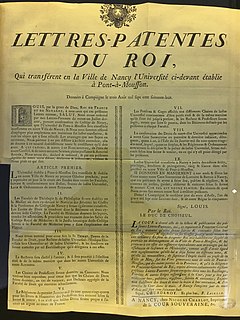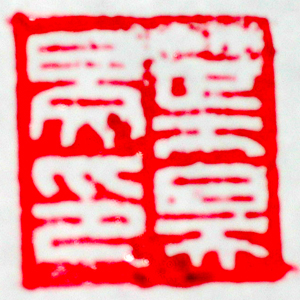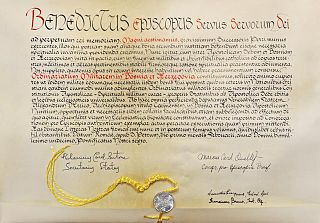| Look up impress in Wiktionary, the free dictionary. |
Impress or Impression may refer to:
| Look up impress in Wiktionary, the free dictionary. |
Impress or Impression may refer to:
| This disambiguation page lists articles associated with the title Impress. If an internal link led you here, you may wish to change the link to point directly to the intended article. |
Seal may refer to any of the following:

A seal is a device for making an impression in wax, clay, paper, or some other medium, including an embossment on paper, and is also the impression thus made. The original purpose was to authenticate a document, a wrapper for one such as a modern envelope, or the cover of a container or package holding valuables or other objects.
Lotus Software was an American software company based in Massachusetts; it was "offloaded" to India's HCL Technologies in 2018.

A papal bull is a type of public decree, letters patent, or charter issued by a pope of the Catholic Church. It is named after the leaden seal (bulla) that was traditionally appended to the end in order to authenticate it.

Letters patent are a type of legal instrument in the form of a published written order issued by a monarch, president, or other head of state, generally granting an office, right, monopoly, title, or status to a person or corporation. Letters patent can be used for the creation of corporations or government offices, or for the granting of city status or a coat of arms. Letters patent are issued for the appointment of representatives of the Crown, such as governors and governors-general of Commonwealth realms, as well as appointing a Royal Commission. In the United Kingdom they are also issued for the creation of peers of the realm. A particular form of letters patent has evolved into the modern patent granting exclusive rights in an invention. In this case it is essential that the written grant should be in the form of a public document so other inventors can consult it to avoid infringement and also to understand how to "practice" the invention, i.e., put it into practical use. In the Holy Roman Empire, Austrian Empire and Austria-Hungary, imperial patent was also the highest form of generally binding legal regulations, e. g. Patent of Toleration, Serfdom Patent etc.
Affiliate marketing is a type of performance-based marketing in which a business rewards one or more affiliates for each visitor or customer brought by the affiliate's own marketing efforts.
Google AdSense is a program run by Google through which website publishers in the Google Network of content sites serve text, images, video, or interactive media advertisements that are targeted to the site content and audience. These advertisements are administered, sorted, and maintained by Google. They can generate revenue on either a per-click or per-impression basis. Google beta-tested a cost-per-action service, but discontinued it in October 2008 in favor of a DoubleClick offering. In Q1 2014, Google earned US $3.4 billion, or 22% of total revenue, through Google AdSense. AdSense is a participant in the AdChoices program, so AdSense ads typically include the triangle-shaped AdChoices icon. This program also operates on HTTP cookies. Over 11.1 million websites use AdSense.
Cost per thousand impressions (CPM), is a term used in traditional advertising media selection, as well as online advertising and marketing related to web traffic. It refers to the cost of traditional advertising or internet marketing or email advertising campaigns, where advertisers pay each time an ad is displayed. CPI is the cost or expense incurred for each potential customer who views the advertisement(s), while CPM refers to the cost or expense incurred for every thousand potential customers who view the advertisement(s). CPM is an initialism for cost per mille, with mille being Latin for thousand.
False advertising is often a crime. In some countries advertising practices are regulated by a government authority, in others the advertising industry is self-regulated and professional associations combat false advertising. False advertising is a type of fraud.
Pay-per-click (PPC), also known as cost per click (CPC), is an internet advertising model used to drive traffic to websites, in which an advertiser pays a publisher when the ad is clicked.

In statistics and business, a long tail of some distributions of numbers is the portion of the distribution having many occurrences far from the "head" or central part of the distribution. The distribution could involve popularities, random numbers of occurrences of events with various probabilities, etc. The term is often used loosely, with no definition or arbitrary definition, but precise definitions are possible.

A seal, in an East and Southeast Asian context is a general name for printing stamps and impressions thereof which are used in lieu of signatures in personal documents, office paperwork, contracts, art, or any item requiring acknowledgement or authorship. In the western world they were traditionally known by traders as chop marks or simply chops. The process started in China and soon spread across East Asia. China, Japan and Korea currently use a mixture of seals and hand signatures, and increasingly, electronic signatures.
Cost per acquisition (CPA), also known as cost per action, pay per acquisition (PPA) is an online advertising pricing model where the advertiser pays for a specified acquisition – for example a sale, click, or form submit
Online advertising, also known as online marketing, Internet advertising, digital advertising or web advertising, is a form of marketing and advertising which uses the Internet to deliver promotional marketing messages to consumers. Many consumers find online advertising disruptive and have increasingly turned to ad blocking for a variety of reasons.
An impression is the overall effect of something.

A bulla is an inscribed clay or soft metal or bitumen or wax token used in commercial and legal documentation as a form of authentication and for tamper-proofing whatever is attached to it. In their oldest attested form, as used in the ancient Near and Middle East of the 8th century BCE onwards, bullae were hollow ball-like clay envelopes that contained other smaller tokens that identified the quantity and types of goods being recorded. In this form, bullae represent one of the earliest forms of specialization in the ancient world, and likely required skill to create. From about the 4th century BCE onwards, as communications on papyrus and parchment became widespread, bullae evolved into simpler tokens that were attached to the documents with cord, and impressed with a unique sign to provide the same kind of authoritative identification and for tamper-proofing. Bullae are still occasionally attached to documents for these purposes.

In the law, a seal affixed to a contract or other legal instrument has had special legal significance at various times in the jurisdictions that recognise it. In the courts of common law jurisdictions, a contract which was sealed was treated differently from other written contracts, although this practice gradually fell out of favour in most of these jurisdictions in the 19th and early 20th century. The legal term seal arises from the wax seal used throughout history for authentication.

The Seal of Dartmouth College is the official insignia of Dartmouth College, an Ivy League university located in Hanover, New Hampshire, United States. Anglo-American law generally requires a corporate body to seek official government sanction, usually in the form of a charter, in order to operate. Such chartered bodies normally authenticate their official acts by marking them with a distinctive seal. The seal's design is usually complicated to avoid counterfeiting, but it can also express something about the institution's history or mission. Dartmouth College is one such chartered body, and it obtained its official seal in 1773.
Website monetization is the process of converting existing traffic being sent to a particular website into revenue. The most popular ways of monetizing a website are by implementing pay per click (PPC) and cost per impression (CPI/CPM) advertising. Various ad networks facilitate a webmaster in placing advertisements on pages of the website to benefit from the traffic the site is experiencing.

DNA phenotyping is the process of predicting an organism's phenotype using only genetic information collected from genotyping or DNA sequencing. This term, also known as molecular photofitting, is primarily used to refer to the prediction of a person's physical appearance and/or biogeographic ancestry for forensic purposes.